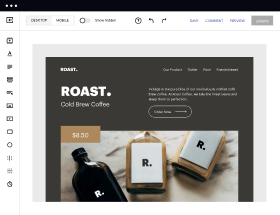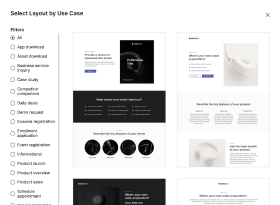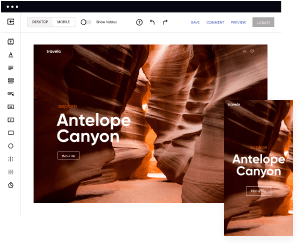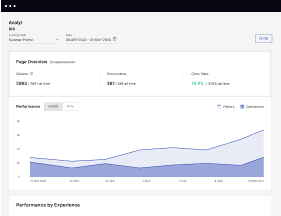Showcase your Salesforce administrators expertise with our mobile page template
Attract clients and showcase your skills with style using our landing page templates for Salesforce administrators. Let's convert those visitors into clients!
Attract clients and showcase your skills with style using our landing page templates for Salesforce administrators. Let's convert those visitors into clients!
Easy to build without coding
With the intuitive drag-and-drop builder, anyone on your team can create high-converting pages without any knowledge of code or design. Make enhancements to your landing page with custom widgets using Javascript, HTML/CSS, or third-party scripts.
Multiple layouts for any industry and goal
Select from 500+ landing page layouts built to boost conversions across industry-specific scenarios. Customize them by adjusting fonts, adding images, and generating on-brand content with the AI assistant. Quickly scale with Instablocks® and Global Blocks that you can save, reuse, and update globally.
Loads fast and looks polished on any device
Every template is responsive, which means they present professionally on any device and load blazingly fast with our Thor Render Engine. You can also power them up with Google AMP technology to deliver an unparalleled mobile experience and drive higher conversions.
Robust analytics & experimentation
Get real-time updates and reporting across all your devices, showing the number of visitors, conversions, cost-per-visitor, and cost-per-lead. Launch AI-powered experiments, run A/B tests, and use heatmaps to analyze user behavior, then optimize your landing page to maximize conversions.
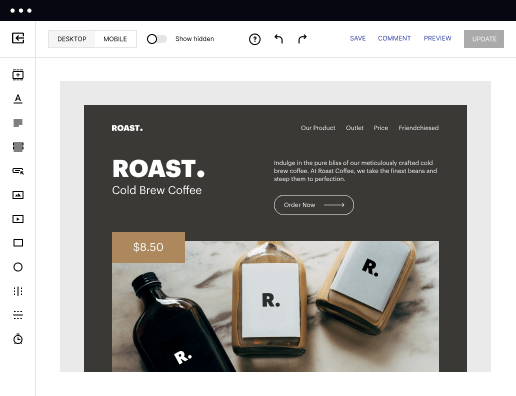
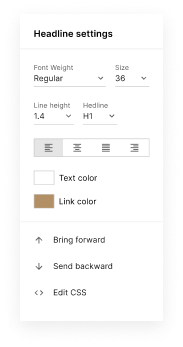
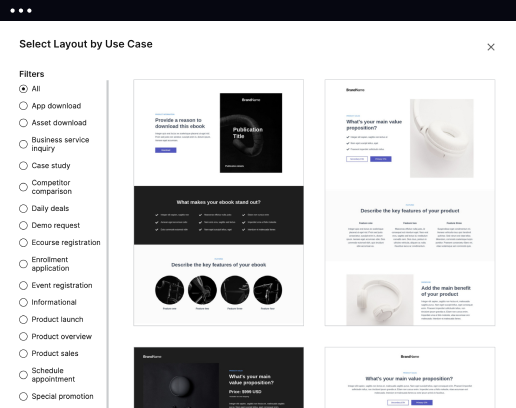
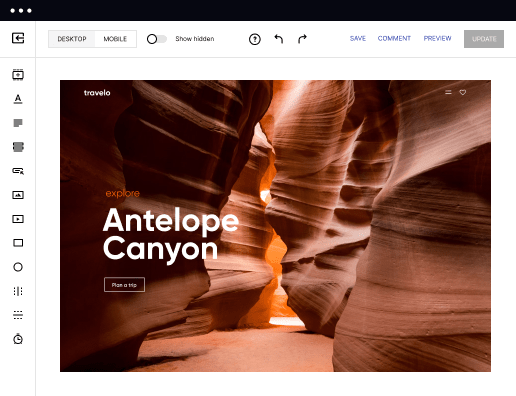
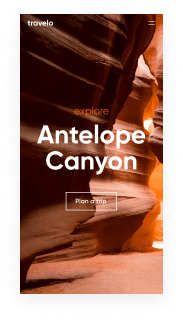
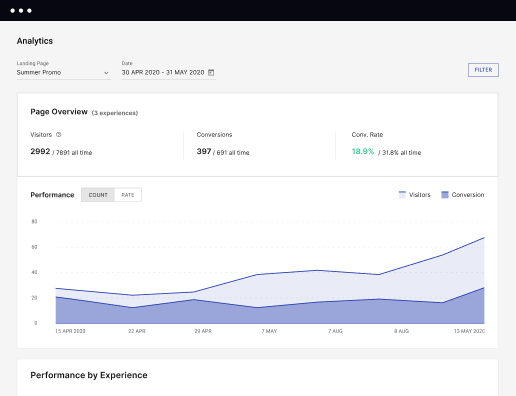
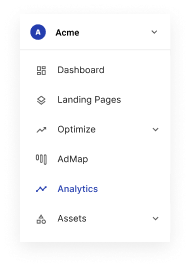
Easy to build without coding
With the intuitive drag-and-drop builder, anyone on your team can create high-converting pages without any knowledge of code or design. Make enhancements to your landing page with custom widgets using Javascript, HTML/CSS, or third-party scripts.
Multiple layouts for any industry and goal
Select from 500+ landing page layouts built to boost conversions across industry-specific scenarios. Customize them by adjusting fonts, adding images, and generating on-brand content with the AI assistant. Quickly scale with Instablocks® and Global Blocks that you can save, reuse, and update globally.
Loads fast and looks polished on any device
Every template is responsive, which means they present professionally on any device and load blazingly fast with our Thor Render Engine. You can also power them up with Google AMP technology to deliver an unparalleled mobile experience and drive higher conversions.
Robust analytics & experimentation
Get real-time updates and reporting across all your devices, showing the number of visitors, conversions, cost-per-visitor, and cost-per-lead. Launch AI-powered experiments, run A/B tests, and use heatmaps to analyze user behavior, then optimize your landing page to maximize conversions.
All the features you need to build lead-generating landing pages
Explore more featuresLearn how to build top-performing landing pages for any goal
FAQs
Leading the way in building high-performing landing pages





Unlocking the power of Instapage for landing page optimization
The importance of high-converting landing pages can never be overstated. Instapage offers marketers in the USA a comprehensive platform to create, optimize, and personalize landing pages that drive results. This step-by-step guide will explore how you can leverage Instapage to maximize the ROI of your digital marketing campaigns.
Getting started with Instapage
To effectively use Instapage, begin by selecting one of over 100 customizable landing page templates. Each template is designed to meet the needs of diverse target audiences across various verticals such as Tech/SaaS, Business Services, and Education. This flexibility allows you to tailor your landing pages to the specific characteristics of your audience, ensuring that you capture leads effectively.
- Templates: Choose from a library of professional-grade templates designed specifically for optimal conversions.
- Lead Generation: Utilize pre-built lead generation elements to enhance your forms and capture essential visitor data.
- Customization: Modify layouts easily using Instablocks, ensuring each page reflects your brand’s identity.
Optimization strategies for higher conversions
To optimize your landing pages for maximum conversions, employ Instapage’s built-in experimentation tools. Understanding visitor behavior through heatmaps allows you to identify the hot zones on your page and optimize those areas for better engagement.
- A/B Testing: Conduct experiments on different elements such as headlines, CTAs, and images to see what resonates with your audience.
- Analytics Dashboard: Monitor performance metrics to make data-driven decisions that enhance page effectiveness.
- Personalization: Use dynamic text replacement to tailor content based on user demographics and interests.
Collaboration and feedback for agile development
Instapage simplifies the review process with its collaboration features. This is especially beneficial for marketing teams in large organizations seeking quick turnarounds. You can provide instant feedback, make real-time edits, and share drafts securely with stakeholders.
- Instant Feedback: Improve team communication with built-in messaging to discuss revisions directly on the page.
- Version Control: Track changes to ensure everyone is on the same page regarding edits and updates.
- Stakeholder Involvement: Share previews and gather input from clients or partners before finalizing pages.
With these steps, you can create landing pages that not only look great but also drive conversions.
In conclusion, Instapage can transform your digital marketing efforts through its comprehensive features designed to cater to any budget or team size. With its emphasis on optimization, personalization, and collaboration, you’ll be well-equipped to maximize your ROI.
Ready to elevate your marketing campaigns? Sign up for Instapage today and start building high-converting landing pages that deliver results. Your next big conversion is just a click away!
People also ask about Mobile page template for Salesforce administrators
Mobile page template for Salesforce administrators
Understanding the mobile page template for Salesforce administrators
In the fast-evolving world of technology, Salesforce administrators must stay ahead of trends to ensure optimal user experiences. One key area of focus is mobile accessibility, a critical aspect since an increasing number of users rely on mobile devices for business tasks. This article will explore mobile page templates tailored for Salesforce administrators, emphasizing their features, design elements, and the creation process.
The evolution of mobile templates in Salesforce
The growth of mobile web usage has been rapid, fundamentally changing how users access information and services. As smartphones and tablets became ubiquitous, the demand for mobile-friendly designs surged. This evolution prompted businesses to pivot towards responsive design, ensuring that their websites and applications provide seamless experiences across devices.
Salesforce recognized these industry shifts and responded with a robust suite of mobile templates. The introduction of these templates reflects a commitment to mobile-first strategies, empowering administrators to create user-centric applications. By prioritizing mobile accessibility, organizations can enhance their operations, drive user engagement, and ultimately increase conversion rates.
Features and functionality of mobile page templates
Mobile page templates in Salesforce boast several core capabilities designed to improve user experience. For instance, they seamlessly integrate with existing Salesforce applications, allowing administrators to leverage the full functionality of the platform. Features like intuitive navigation, quick-loading content, and touch-friendly interfaces make these templates suitable for a mobile-centric audience.
There are also various template layouts available to cater to different needs. Administrators can choose from single-column layouts that prioritize simplicity or multi-column layouts that enhance organization. When selecting a layout, it's essential to consider best practices; for example, aligning the layout type with the type of content being presented can improve user engagement.
Seamless integration with Salesforce apps
Touch-friendly, intuitive navigation
Flexible layouts to suit various content types
Customization options are another highlight of mobile page templates. Administrators can easily integrate their branding, such as specific fonts, colors, and logos, to maintain consistency with their organization's identity. Additionally, dynamic content can be displayed based on user profiles, tailoring the experience to different segments of the audience.
Template structure and design elements
The structure of mobile templates is crucial for ensuring user engagement and easy navigation. Key design components include headings and titles that not only introduce the page’s theme but also capture user interest. Best practices dictate that concise, clear language is critical in these areas, as users tend to skim content on mobile devices.
Furthermore, leveraging sections and grids allows for effective use of space. By organizing content logically, administrators can help users find information quickly without feeling overwhelmed. This arrangement can also enhance visual appeal, making the template more user-friendly.
Utilize clear headings for easy navigation
Organize content in sections and grids
Incorporate interactive elements to enhance engagement
Interactive elements like buttons, links, and calls to action are integral to usability. Making sure these elements are prominently displayed and easy to interact with can significantly improve user experience. Additionally, integrating multimedia components such as images, videos, and galleries can enrich content and make it more engaging, significantly affecting how users interact with the page.
Navigating the template creation process
Creating a mobile page template involves several clear steps that administrators can follow. First, selecting the right mobile template is crucial; understanding the target audience and their needs will guide this decision. Next, customizing visual elements like logos and colors helps to establish brand identity and ensure consistency.
Implementation goes beyond mere aesthetics; administrators need to add necessary functionalities too. This includes populating fields, embedding buttons, and adding links that facilitate seamless navigation. After creating the page, thorough testing and optimization strategies should be employed to identify performance issues and enhance user experience.
Select the right mobile template
Customize visual elements
Implement necessary functionalities
Test and optimize
Incorporating screenshots can serve as valuable guidance throughout this creation process. Visual aids provide clarity on configuration options and can help streamline the onboarding experience for new administrators. Sample screenshots illustrating various template setups can enhance understanding and inspire creativity.
Addressing common challenges and pain points
While creating and implementing mobile page templates, administrators may encounter several challenges. Integrating third-party applications into mobile templates can often be a technical hurdle, requiring careful navigation of API and compatibility issues. Striking the right balance between aesthetics and functionality is another common concern, as over-designed pages can lead to user frustration.
To overcome these hurdles, troubleshooting hacks can be applied. Administrators should familiarize themselves with common issues during setup and how to effectively resolve them. Performance optimization tips, such as focusing on loading speed and responsiveness, can also help mitigate potential frustrations.
Integrate third-party applications with care
Balance aesthetics with functionality
Optimize for performance to minimize user issues
Use cases: inspiring examples of successful implementations
Examining real-world applications of mobile page templates provides valuable insights into their potential. For example, in a sales environment, companies have successfully utilized mobile templates to create engaging and accessible product catalogs. These catalogs not only display essential information but also provide enhanced navigation and easy access to purchase links.
Non-profit organizations have also leveraged mobile templates effectively. By using these templates for fundraising initiatives, they can share compelling stories, drive engagement, and increase donations through mobile devices. Each use case illustrates how tailored mobile experiences can transform user interaction and potentially amplify results across industries.
Sales teams effectively using templates for product catalogs
Non-profits utilizing templates to enhance fundraising efforts
Different roles within an organization also benefit from well-implemented mobile templates. Sales representatives can quickly access relevant product information, while customer service teams can provide timely support through mobile-friendly interfaces. Understanding these varied impacts enhances administrators' ability to create more personalized and effective templates.
Future outlook: the next frontier for mobile templates
Looking ahead, the future of mobile templates within Salesforce is exciting. Anticipated features and enhancements may include advanced personalization capabilities that align with emerging trends in mobile design. Incorporating AI and machine learning into template functionalities could pave the way for incredibly intuitive and adaptive user experiences, fundamentally shifting how users interact with content.
Furthermore, obtaining feedback from the Salesforce administrator community is crucial. Engaging users for input and suggestions will help inform the development of future templates to ensure they meet the evolving needs of organizations and users alike.
Maximizing impact: post-deployment strategies for administrators
After launching mobile page templates, monitoring their performance should be a priority. Salesforce provides valuable analytics tools that enable administrators to track user engagement, conversion rates, and other vital metrics. This data can aid in understanding how users interact with templates and highlight areas for improvement.
In addition to regular monitoring, ongoing testing and feedback are essential components of success. Implementing user surveys can provide qualitative insights into user satisfaction and preferences. A/B testing different template versions allows administrators to discover which layouts and content best meet user needs, fostering a cycle of continuous improvement.
Monitor performance using Salesforce analytics tools
Seek ongoing feedback through user surveys
Conduct A/B testing for continuous optimization
Resources and tools to elevate mobile page optimization
Equipping Salesforce administrators with the right resources can significantly enhance their ability to create impactful mobile templates. Essential applications designed for Salesforce can provide additional functionality and streamline customization processes. These tools can help create more engaging user experiences, driving conversions and fostering brand loyalty.
Furthermore, avoiding common pitfalls in mobile page creation can save time and frustration. Simple tips such as predetermining content organization and focusing on mobile responsiveness can lead to smoother workflows. Ensuring that administrators are well-informed and prepared to tackle challenges will ultimately contribute to more successful implementations.
Explore essential applications for enhanced functionality
Prioritize mobile responsiveness in designs
Organize content effectively to streamline creation
Exploring the intersection of mobile templates and user experience
User experience should always be at the forefront of mobile template design. By prioritizing user-centric design, administrators can create mobile templates that not only engage but also satisfy the diverse needs of their audience. Effective mobile templates can transform the interaction users have with brands, making information more accessible and experiences more enjoyable.
Capturing user attention through streamlined experiences is a vital goal. When mobile templates are thoughtfully crafted, they can lead to increased interactions and conversions, ultimately benefiting both users and organizations. Focusing on user experience enhances the value that mobile templates bring to Salesforce administrators and their teams.
Ready to skyrocket conversions?
Supercharge your ad campaigns with high-performing landing pages
Get started



